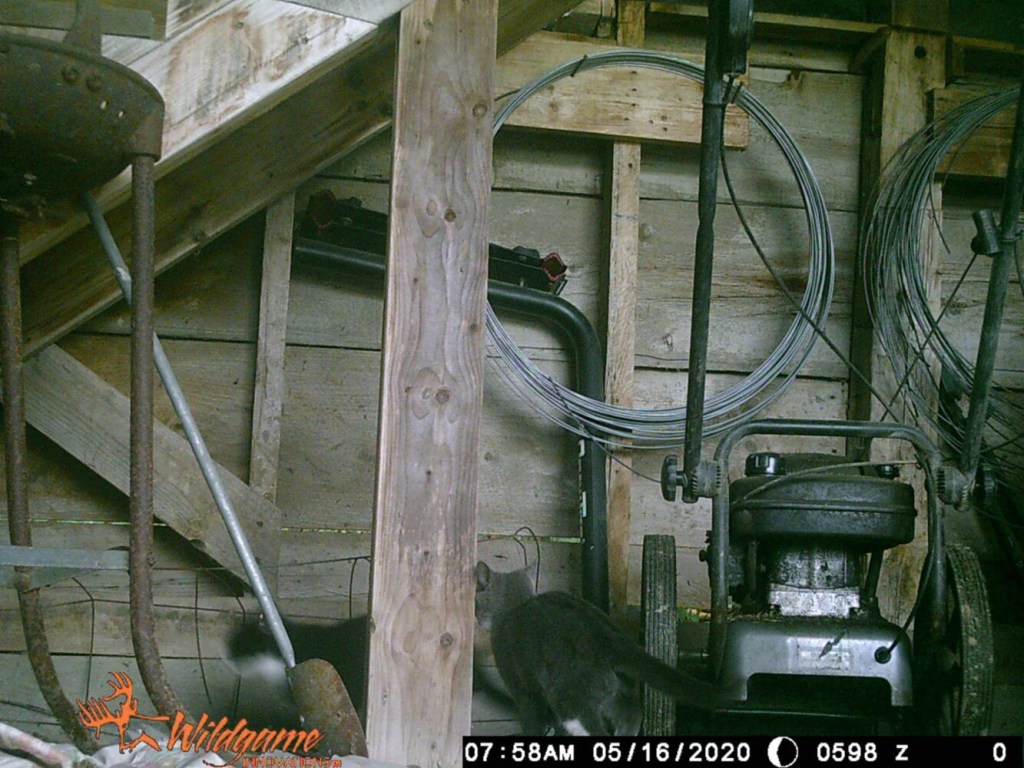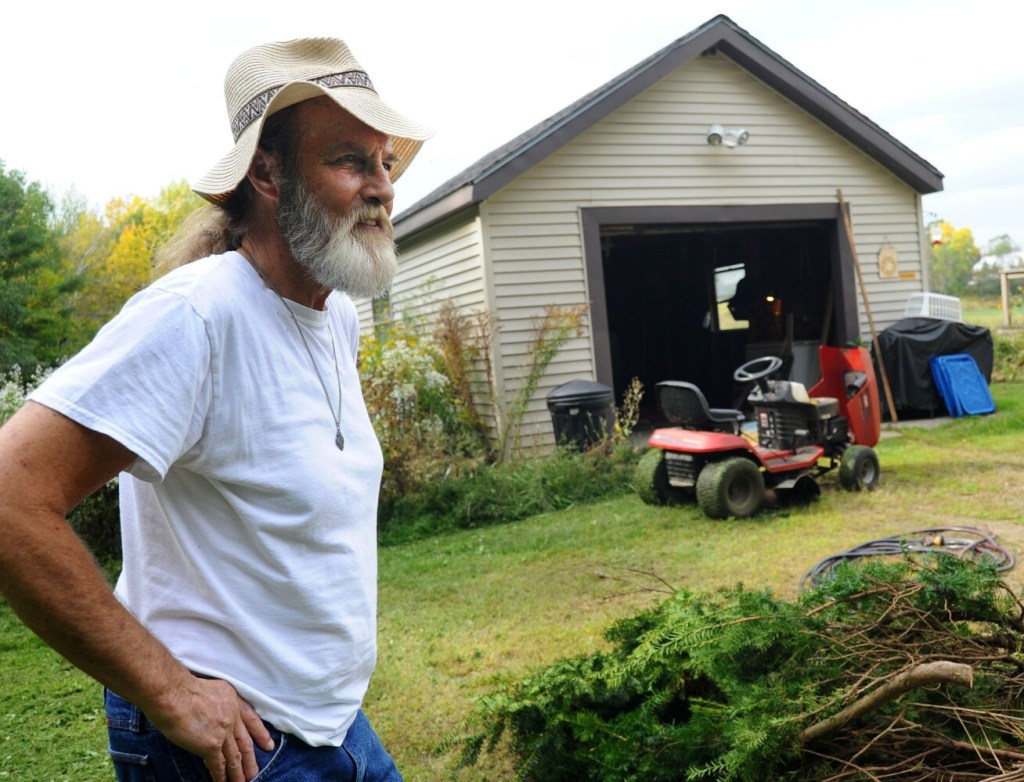CHINA — Every day after Jim Dolan eats breakfast — and again before dinner — he pours kibble onto three paper plates in his garage and forgets about the faded yellow sign to the right of the door that reads “No Solicitors.”
“All I have to do is holler ‘Come eat!’ and they’ll come out from there, there, there, there,” he said, gesturing to gaps in the tree line and brush around his home on Fire Road 11, off Neck Road in China.
Like clockwork, any combination of eight adult cats and five kittens will emerge.
Four years ago, when Dolan spotted the first of the feral felines — Mrs. Kitty — he did not think much of it. Then, every spring after that, two more kittens appeared.
“I just continued on,” said Dolan, 64. “I didn’t want them killed.”
Besides, the cats helped keep mice away.

A feral kitten is shown Monday in the garage of Jim Dolan, who lives next to China Lake in China. Photo courtesy of Jim Dolan
It did not take long before Dolan, who had never taken care of a cat before, started laying out heating pads during the winter to provide warmth and ensure the bowl of water he had left out would not freeze.
But after the cat colony grew to 13 this year, the retired architectural sales representative knew it was time to do something. The creatures had started eating the butterflies, hawk moths and songbirds that frequented Dolan’s property. Then, a few took up part-time residence in two of his landlord’s sheds.
Last week, Dolan and his landlord, Marie Michaud, called the Cat Coalition of Western Maine and discussed a plan to trap, neuter and release the felines — a common management strategy — so the population would stop growing.
Stephanie Mains, president of the Cat Coalition, told the Morning Sentinel situations like the one Dolan and Michaud face are far from unique in Maine. This year’s summer-to-fall transition has been one of the busiest seasons yet for the 8-year-old organization, which specializes in trapping large colonies of 30 to 120 cats, Mains said.
“We go all over the state — Machias, Houlton, Caribou, Waterville, Farmington, Wells, Vineyard — and no matter what town you’re in, there are feral cats,” she said.
“But it just seems like right now, there are a lot of kittens, and that just tells us that as much as we think that we knocked it down, we really haven’t. You go in and clean up one spot, get all the cats spayed and neutered, then you turn around three years later and you’re going back to that same spot.”

Jim Dolan of China has been sheltering and feeding feral cats in the garage of his home next to China Lake. Dolan said he’s kept the cats warm and fed during minus-20 temperatures. Dolan is shown with the garage Monday. Morning Sentinel photo by Rich Abrahamson
Shelters in Waterville and Augusta say they have been stuffed to the brim with cats and kittens recently.
The Humane Society Waterville Area, which serves 25 communities, reported having more than 200 felines in its care, including fosters. And the Kennebec Valley Humane Society in Augusta had about 275.
Representatives from the shelters and Mains attributed the high numbers to the ripple effect of abandoning unfixed cats outside, a practice that is especially common as people close camps for the season.
Mains said to avoid the shelter pipeline, the Naples-based Cat Coalition tries to find homes for the many feral kittens it catches, and for cats that do not have anyone feeding them regularly. The group releases adult cats back into their territory after spaying or neutering them if at least one so-called feeder is willing to care for them.
Right now, the Cat Coalition is tackling a colony in Waterville whose feeder, an elderly man, died recently.
“We went up (Sept. 13) and trapped eight, but there are more that still need to be trapped — probably eight or 10,” Mains said. “These cats were starving. I wouldn’t say that they were dire-straits thin, but they were pretty thin.”
Friends of Feral Felines, a trap, neuter and release group out of Portland, assisted with the Waterville rescue and is helping find permanent owners for the four adult cats and four kittens.
The feral colony near Dolan’s house in China is the Cat Coalition’s queue, and will likely be addressed in the next few weeks, according to Mains. There is at least one other large feral cat colony in China, according to Mains, but she said she had not received reports of other colonies in the Waterville area — though she is sure more are out there.

Food being placed in bowls for feral cats are captured through a game camera Monday in the garage of Marie Michaud’s homestead in China. Feral cats slip into the garage and are being fed before they can be netted, according to Michaud. Photo Courtesy Marie Michaud
Mains advised anyone with a cat colony nearby to start putting food out at set times of the day until a group like the Cat Coalition can come. Michaud is among those who have heeded that advice.
“I know a lot of people say don’t feed them,” she said, “but we want you to feed them because it makes it easier for us to trap them.”
Dolan said despite his being on a fixed income, he does not mind paying for a 16-pound bag of cat food every 10 days.
“There’s no question — they do appreciate it,” Dolan said.
Though Dolan has developed a soft spot for the feral cats, each of which he has named, he and Michaud said they are hoping to ultimately find homes for the eight adults that live near Fire Road 11. The Cat Coalition will be responsible for finding caregivers for the five kittens.
Dolan said while he will be sad to see the cats go, he thinks it will be for the best.
“It’s getting harder for me to take care of them, with temperatures (reaching) 20 below and 4 feet of snow in the winter,” Dolan said. “I want them to have a good home. They can do better.”
On the lawn outside his house on a recent, particularly hot autumn afternoon, the gentle-mannered man with a white ponytail and a wide-brimmed sun hat redirected the spotlight.
“The big deal is not the guy who feeds the cats,” he said. “It’s the guy who abandons them.”
Send questions/comments to the editors.













